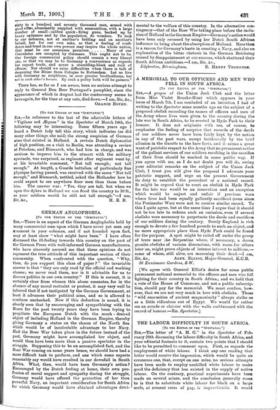A MEMORIAL TO OUR OFFICERS AND MEN WHO FELL IN
SOUTH AFRICA.
[TO THE EDITOR OP TUB "SPECTATOR."]
SIR, A propos of the Union Jack Club and the letter from Miss Violet Brooke-Hunt which appears in your issue of March 7th, I am reminded of an intention I had of writing to the Spectator some months ago on the subject of a proposed obelisk recording the names of officers and men of the Army whose lives were given to the country during the late war in South Africa, to be erected in Hyde Park to their honour. It does not originate with me, of course, to emphasise the feeling of surprise that records of the deeds of our soldiers never have been fairly kept by the nation in any of the past wars, except incidentally by the brief allusion in the Gazette to the bare facts, and it seems a great want of patriotic respect to the Army that no permanent notice of the gallant services of our soldiers resulting in the sacrifice of their lives should be marked in some public way. It you agree with me, as I do not doubt you will do, seeing your editorial remarks on the subject of the Union Jack Club, I trust you will give the proposal I advocate your patriotic support, and urge on the present Government its duty to establish the precedent of a national record. It might be argued that to erect an obelisk in Hyde Park for the late war would be an innovation and an exception which would be unjust and unfair if previous wars where lives had been equally gallantly sacrificed (even since the Peninsular War) were not to receive similar record, To this I quite agree, but at the same time I argue that it should not be too late to redress such an omission, even if several obelisks were necessary to perpetuate the deeds and sacrifices of our soldiers during the century. Surely England is rich enough to devote a few hundred pounds to such an object, and no more appropriate place than Hyde Park could be found for the purpose. A spot might be railed off under the group of trees near die Serpentine where, if necessary, a dozen granite obelisks of various dimensions, with room for others later on, might prove objects of intense interest to millions,— some of whom, still alive, are mourning their dead.—I am,
Sir, &c., ALEX. ELLIOT, Major-General, K.C.B. 36 Ennismore Gardens, S.W.
[We agree with General Elliot's desire for some public permanent national memorial to the officers and men who fell fighting for their country in South Africa; and we bold that a vote of the House of Commons, and not a public subscrip- tion, should pay for the memoriaL We must confess, how- ever, that we are not very much in love with obelisks. Those "wild enormities of ancient magnanimity" always strike us as a little ridiculous out of Egypt. We would far rather see an arcade or cloister with the walls emblazoned with the record of honour.—ED. Spectator.]










































 Previous page
Previous page